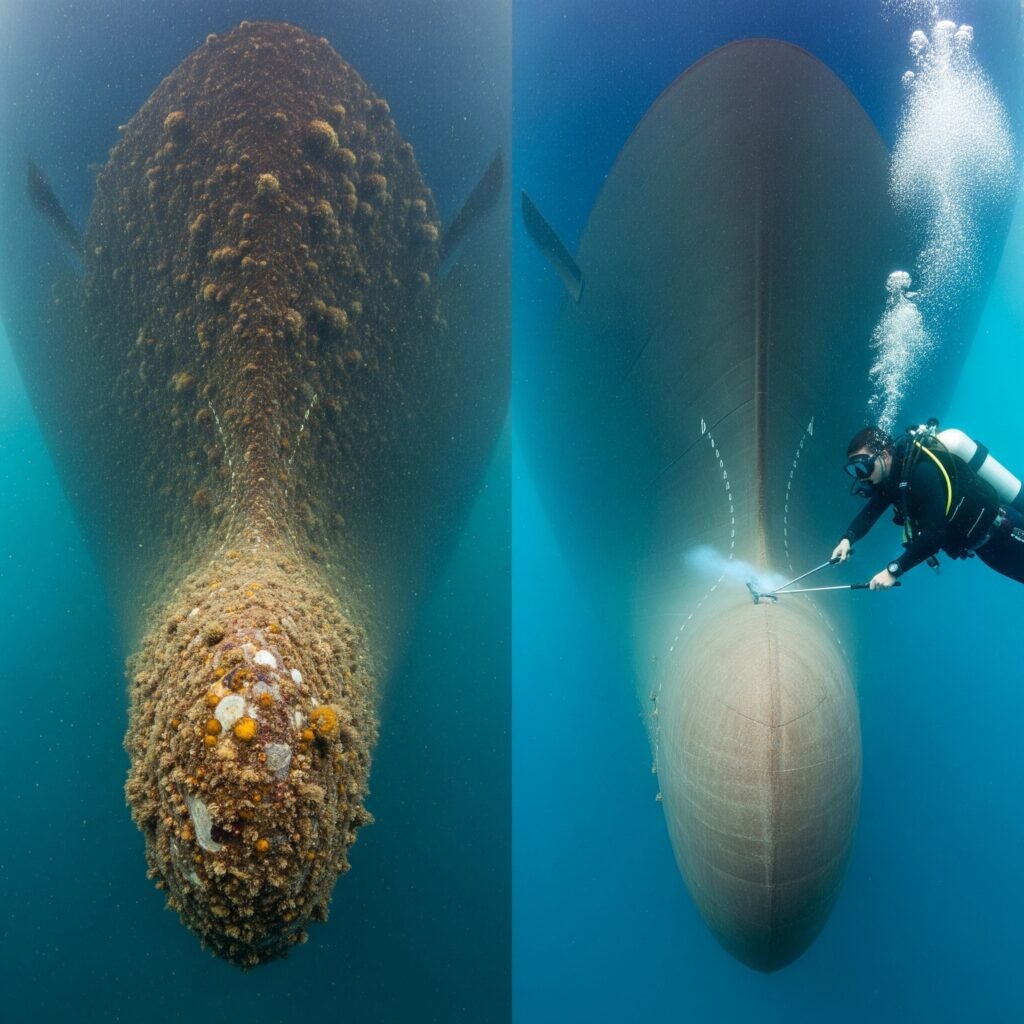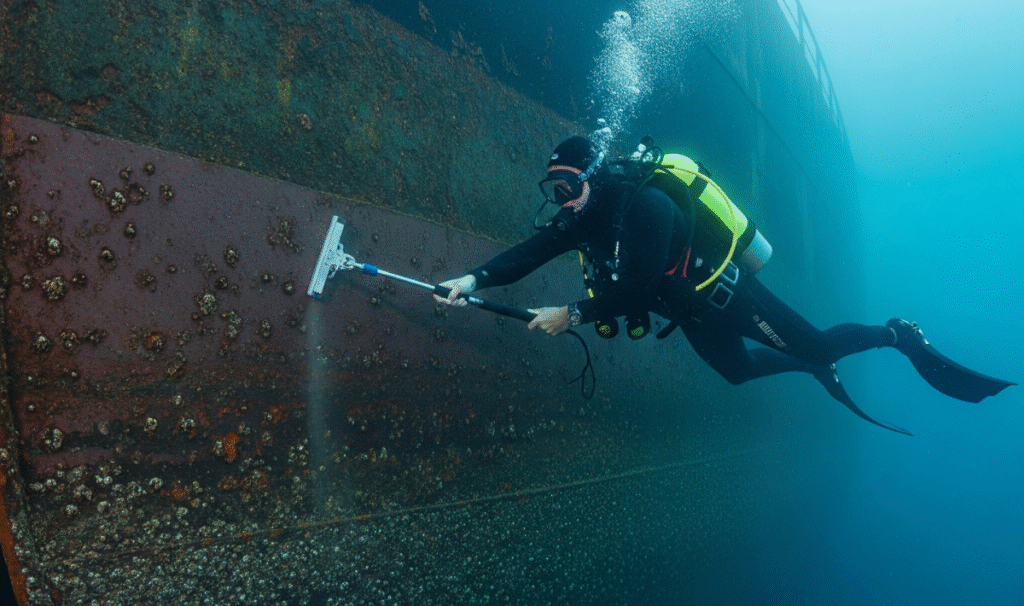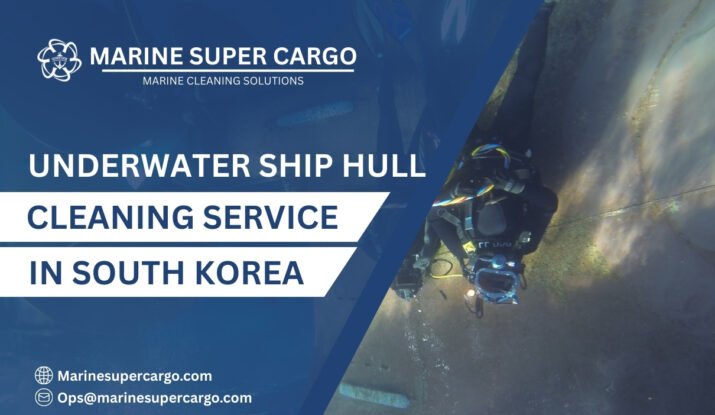Imagine driving your car with mud caked all over the wheels—it would slow you down, strain the engine, and make every trip costlier. Now picture the same happening to a ship, but instead of mud, it’s marine organisms like barnacles, algae, and mussels clinging to the hull. This is where underwater ship hull cleaning in South Korea becomes a game-changer.
South Korea, a maritime powerhouse, sits at the heart of global trade. With bustling ports like Busan and Ulsan handling massive shipping traffic, maintaining ship performance is more than just a best practice—it’s a necessity. Underwater hull cleaning ensures vessels remain efficient, compliant, and safe while sailing through domestic and international waters.
What is Hull Fouling?
Hull fouling refers to the accumulation of marine organisms on a ship’s underwater surfaces. It often begins with a thin film of microorganisms, which then attracts algae, barnacles, and other sea life. Over time, this growth forms a rough, resistant layer that increases drag as the vessel moves through water. The consequences are costly—ships require more fuel, operate at reduced speeds, and face higher maintenance demands. Left unchecked, hull fouling not only strains efficiency but also impacts safety and environmental sustainability.
How Cleaning is Performed Underwater
Underwater cleaning involves divers or robotic systems scrubbing, brushing, or jetting off fouling without taking the ship to dry dock. For a busy maritime hub like South Korea, this saves crucial downtime and helps ships stay on schedule.

Role of Biofouling in Fuel Consumption
According to the International Maritime Organization (IMO), even a thin layer of slime can increase fuel use by 10%. Heavier fouling, such as barnacles, may push this figure to 40% or more. That’s like making a car run with half its tires flat—inefficient and extremely costly.
How Cleaning Boosts Ship Performance
By performing underwater ship hull cleaning in South Korea, ship operators immediately notice smoother sailing, reduced drag, and significant fuel savings. Less fuel not only saves money but also reduces emissions, making it a double win for shipowners and the planet.
Eco-Friendly Practices in South Korea
South Korea is known for adopting environmentally responsible shipping practices. Hull cleaning plays a direct role in protecting marine ecosystems by stopping the spread of invasive species from one port to another. Some cleaning techniques also employ capture-and-filter systems to ensure debris doesn’t pollute surrounding waters.
Meeting IMO and MARPOL Regulations
Environmental rules are tightening across global shipping. The MARPOL Convention and IMO regulations demand proactive steps to reduce emissions and marine pollution. Engaging in consistent underwater ship hull cleaning in South Korea ensures vessels comply with these international standards while upholding sustainable operations promoted by organizations like the International Association of Ports and Harbors (IAPH).
Preventing Corrosion and Damage
Marine growth traps moisture and accelerates corrosion, eating away at protective coatings and the steel beneath. Think of it like termites quietly damaging a wooden house—it may look alright outside until major trouble strikes. Regular cleaning strips off this biological layer, letting protective coatings last longer.
Supporting Safer Marine Operations
A fouled hull compromises not only efficiency but also navigational safety. Clean hulls give captains more predictable ship handling, which is critical in crowded South Korean waters. Regular underwater ship hull cleaning in South Korea minimizes costly accidents and ensures smoother, safer voyages.
Strong Maritime Infrastructure
With world-renowned shipyards and top-tier port facilities, South Korea is perfectly positioned to lead in maritime maintenance practices. Ports are well-equipped for underwater inspection and cleaning services, ensuring minimal downtime for vessels.
Advanced Technology & Skilled Diving Teams
South Korean maritime service providers leverage cutting-edge tech, such as remotely operated cleaning robots and eco-friendly scrubbers. Combined with highly trained divers, these techniques enhance precision, ensuring ships are efficiently cleaned without compromising coatings or the marine environment.
Is Underwater Cleaning Always Safe?
Some operators fear that cleaning might damage specialized coatings. However, with modern techniques and skilled teams, risks are minimized. In fact, skipping cleaning often causes more damage due to long-term fouling and corrosion.
Balancing Costs and Benefits
At first glance, underwater cleaning might look like an added expense. But in reality, it pays for itself. Reduced fuel costs, fewer dry-docking needs, and compliance with regulations make underwater ship hull cleaning in South Korea a smart investment.

Innovations in Robotic Underwater Ship Hull Cleaning in South Korea
The future points to autonomous robots equipped with cameras, sensors, and eco-friendly cleaning systems. These machines can work faster, safer, and more sustainably than human divers.
Role of AI and Sustainable Solutions
With artificial intelligence analyzing fouling patterns and optimizing cleaning schedules, ships will be able to maximize performance year-round. South Korea, being tech-driven, is already exploring AI-backed, carbon-neutral solutions for hull cleaning.
Conclusion
Underwater hull maintenance might not sound glamorous, but it’s the silent hero of global shipping. By ensuring fuel efficiency, protecting ecosystems, and extending vessel lifespan, underwater ship hull cleaning in South Korea delivers undeniable value. With advanced technology, eco-conscious practices, and global compliance, South Korea is emerging as a maritime leader shaping a greener, cost-effective future for shipping. Partnering with CleanShip.co ensures world-class, sustainable hull cleaning solutions that keep vessels efficient, compliant, and environmentally responsible.
FAQ:
Q1. How often should ships undergo underwater hull cleaning in South Korea?
Most ships benefit from cleaning every 6–12 months, depending on operating routes and biofouling intensity.
Q2. Does hull cleaning damage a ship’s protective coating?
Not with modern methods. Skilled divers and specialized equipment ensure coatings are preserved while fouling is removed.
Q3. Is underwater ship hull cleaning in South Korea environmentally safe?
Yes. Providers often use debris-capturing systems to prevent pollution, aligning with IMO and MARPOL guidelines.
Q4. Can robotic cleaning fully replace divers in South Korea?
Not completely yet. While robots handle repetitive cleaning tasks, skilled divers remain vital for detailed inspections and complex areas.
Q5. What’s the biggest cost-saving benefit of underwater ship hull cleaning in South Korea?
Fuel efficiency tops the list. By reducing drag, ships save thousands of dollars in fuel costs per voyage, while also lowering emissions.


